Big picture of a big nation
Updated: 2014-09-12 07:47
By Andrew Moody in Beijing and Cecily Liu in Oxford(China Daily Europe)
|
|||||||||||
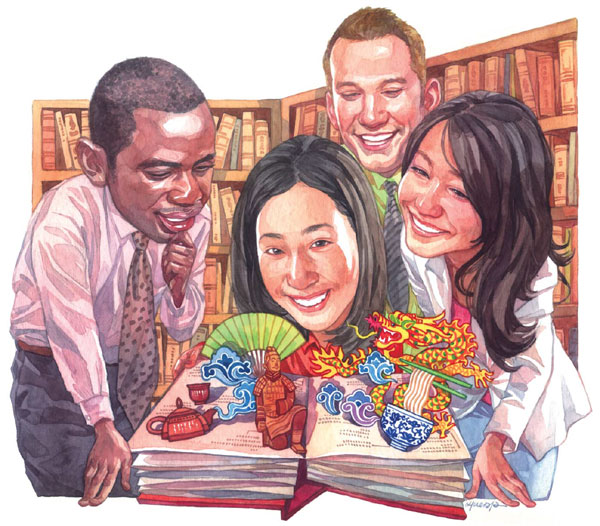
China centers around the world are gearing up to study the modern, multi-dimensional country
The official opening of the China Studies Centre at Oxford University, the largest such center in Europe, was a fanfare event.
Prince William, who officially launched the center on Sept 8, told those assembled: "Learning from and learning about China has never been more important than it is now."
Although the occasion was slightly upstaged by news of an impending royal birth, which meant the Duchess of Cambridge could not attend with her husband as planned, the new center is seen as a further landmark in the academic study of China around the world.
The 21-million-pound ($33.7 million; 26.2 million euros) center in the grounds of St Hugh's College, is a far cry from the China (mostly East Asian) centers in the United States that largely emerged out of the Cold War in the 1950s and 1960s and were funded by the Ford Foundation and others.
It will compete against other European China studies centers, including Heidelberg University's Center for East Asian Studies, launched nearly a decade ago, and the newly established Graduate School for East Asian Studies at Freie Universitat in Berlin.
There are also centers emerging in parts of the world where China has new influence such as in Africa, with the Centre for Chinese Studies at Stellenbosch University in South Africa's Western Cape Province and also new ones in Latin America in both Brazil and Argentina.
The Oxford center will be home for 25 permanent faculty members (although 45 academic staff work on China at the university as a whole) and will be headed by one of Europe's leading Sinologists, Rana Mitter, it is the reaffirmation of a 400-year association with China, which began with a major collection of Chinese books at the Bodleian Library.
William C Kirby, TM Chang Professor of China Studies at Harvard University, who was speaking from Hong Kong, said the opening of the Oxford center was a landmark event in the development of China centers.
"Oxford in recent years has done a remarkable job in bringing together this extraordinary team of leading academics on China in such a beautiful faculty building," he says.
Kirby, who until last year was director of the Fairbank Center at Harvard, one of the US' leading China centers, which was founded in 1955, says such centers play an important role in delivering people with the expertise to deal with a world in which China is a rising power.
"Studying about China is completely different to 30 or 40 years ago. We train some extraordinary people at Harvard and there is not one now who goes through Chinese studies that does not get a job placement either in the academic world, in government or in business."
Clayton Dube, executive director of the US-China Institute at the University of Southern California, another leading China center in the US, speaking from Los Angeles, says Oxford's new center is a reflection of the new multi-disciplinary approach required to China.
"What China's economic rise has meant is that interest has widened beyond China-centered political scientists, sociologists, historians and others. It has brought in folks that wouldn't have previously thought about China in regards to, say, architecture, urban planning, law and even anti-smoking campaigns and myriad other things," he says.
"They wouldn't have thought about China in regard to these things. Now it is impossible to imagine not thinking about China in relation to almost any issue."
David Shambaugh, professor of political science and international affairs at George Washington University in Washington, DC, who was in Beijing, says, however, he does not believe there is anything radically new about the launch of the Oxford China center.
"In my recollection it is the third time they (Oxford) have opened a China center in the past 20 years," he says.
Shambaugh, also author of China Goes Global: The Partial Power, which highlighted the limits of China's influence and which has just been published in paperback, also thinks there is nothing new in the multi-disciplinary approach of studying China since it has a long tradition in the US and the UK, although not in continental Europe.
"This interdisciplinary approach dates back to the 1960s and 1970s, and it is an Anglo-American tradition whereas the Franco-German and Scandinavian approach is more Sinologically-based," he says.
Hinrich Voss, deputy director of the Business Confucius Institute at Leeds University, disputes Shambaugh's assertion and says there is now very much a convergence in the concept of what a China center is in both Europe and the US.
"When I studied at Duisburg University (in Germany), there were many colleagues focusing on different Asian countries and from different political science backgrounds, which created quite a cross-fertilization of ideas," he says.
Voss, who is also a researcher in Chinese economy and management at another China-focused center, the White Rose East Asia Centre, a joint venture between Leeds and Sheffield universities, says there are risks, particularly now that China is a major economic power, of taking such a narrow approach.
"If you are just dealing with the specifics of China, you may not see the bigger picture. You may think something is unique to China whereas it may have been experienced by many other countries," he says.
Kerry Brown, who is head of what is rapidly emerging as one of world's leading such centers, the China Studies Centre at the University of Sydney, says that being an effective China center means more than putting a brass plate on the door.
"In the past you would have a China center in name but they didn't have any major role at the university. They were usually sleepy little backwaters," he says.
Brown, former head of the Asia program at London-based foreign policy think tank Chatham House and who became executive director in 2012 of the Sydney center, which now has 140 academic members, says the top China centers have to hold major events, have established relations with Chinese policymakers and also reach out to business leaders and other key figures in the community.
"We do big annual events in business, do a lot of work with policymakers in the Chinese government and work with a number of partners in China. We also do a lot of media work. You now need to do major outreach to be an effective China center," he says.
One of the leading China studies centers in the UK is the School of Contemporary Chinese Studies at Nottingham University, which was founded in 2007. It has its own research arm, the China Policy Institute.
Steve Tsang, head of the school, says the Oxford launch is "a wonderful and important event".
"A stronger Oxford center will mean greater competition, which should result in everyone getting better and being more competitive. It is good for Chinese studies," he says.
Tsang, however, insists a modern university like Nottingham could still have the edge over an ancient, diverse college-based university like Oxford.
"Given the collegial nature of Oxford University, how far the China Centre can coordinate research on China across the whole university remains to be seen," he says.
"The structural constraints there are greater than a more centrally-run modern university."
China centers outside of the West are having to adapt to new approaches to studying China.
The Centre for Chinese Studies at Stellenbosch University, the result of a bilateral commission between China and South Africa in 2004, was originally a Confucius Institute but converted to a research center for China-Africa relations five years ago.
Set among Western Cape vineyards, it is the only such center in sub-Saharan Africa.
Ross Anthony, acting director, says starting from scratch in the developing world has given Stellenbosch certain advantages.
He says the center has been able to go straight to being a multi-dimensional China center without the Sinological detour because there had never been a previous tradition in Africa.
"It is like the leapfrogging over landline telephones to mobile phones," he says.
Anthony says any African China center is likely to take on a different character from those in Europe or North America.
"Most scholars specializing in China-Africa relations are not Sinologists - they come from development studies, African studies, economics, anthropology and other areas.
"Because China's influence in this region is so recent, there is very little in the way of a previous disciplinary framework. In this sense, the emergence of the field is a hotchpotch of different fields and methodological approaches."
He says the center also battles with the fact there is little support for China education on the continent, such as teaching Chinese in schools or supporting Chinese educational programs.
"Despite decolonization being over a half a century ago, there is still a tendency to view world history as essentially European history," he adds.
Dube at the University of Southern California, however, argues it is not just in Africa where there is a need for more China expertise.
"I think that is a problem facing us all. The sudden rise of China means there is inevitably a lag between the number of China experts available and the demand for them," he says.
Kirby at Harvard also believes this is a major issue facing all China centers.
"I think that is inevitably correct. China centers will demand strong leadership, commitment and enterprise and an entrepreneurial spirit for development to combat some of these issues," he says.
Brown at Sydney says the fundamental new role of China centers such as the new Oxford one, has to be encouraging more engagement with China.
"China centers need to be more imaginative in getting people engaged with China.
"Of course they should not lose their academic credentials and there is a need for hardcore doctorate research in very specialist areas but there needs also to be more entrepreneurialism and more vision," he says.
Contact the writers through andrewmoody@chinadaily.com.cn
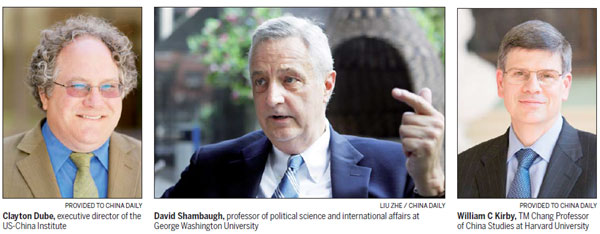
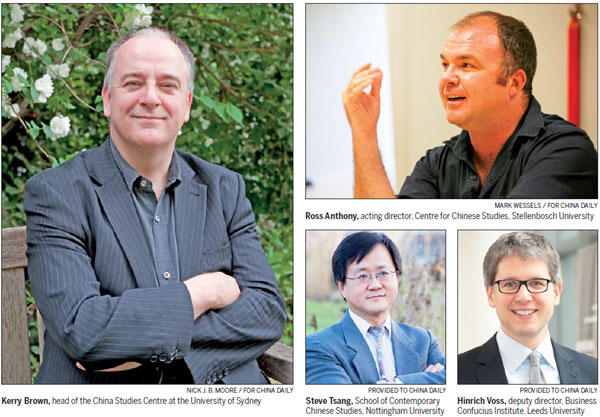
(China Daily European Weekly 09/12/2014 page6)
Today's Top News
Obama orders airstrikes in Syria for first time
Putin blames West for Ukraine crisis
Cameron ' would be heartbroken' if Scotland leaves Union
China restricts overseas TV
Nation capable of hitting growth targets, Li says
Chinese peacekeepers to support South Sudan
Russia lays responsibility for MH17 crash
Space station eyes cooperation with other countries
Hot Topics
Lunar probe , China growth forecasts, Emission rules get tougher, China seen through 'colored lens', International board,
Editor's Picks

|
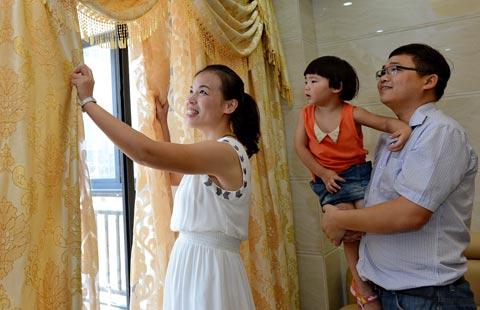
|

|

|

|
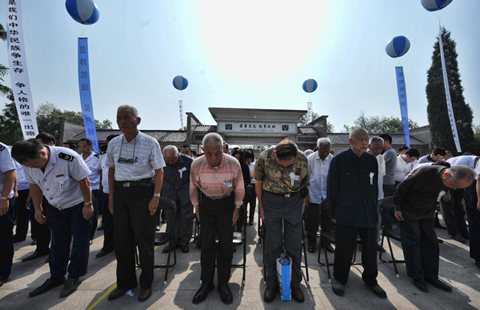
|





